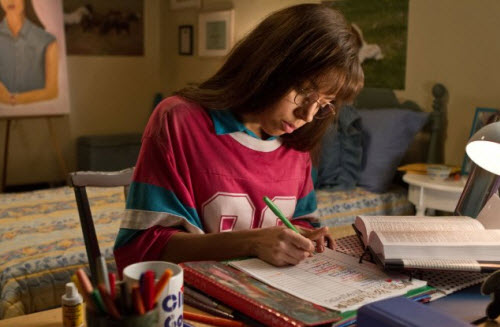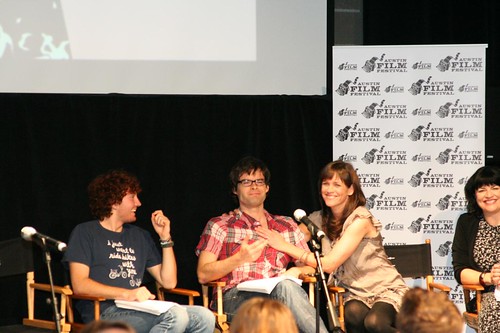Interview: Maggie Carey, 'The To Do List'
When interviewing filmmakers and actors for upcoming new releases, journalists like me usually get ten minutes. It can be very limiting. There are the interviews where the subject has his/her answers down pat and will launch into answers when you've barely asked the questions. There are the assembly-line interviews where the actor is getting bored because you're the dozenth person he or she has spoken with that day. After some of these, I wonder if I'm bringing anything different to an interview feature than the 40 other articles that will appear in print and online around the movie's release.
But some interviews feel like real conversations, and 10 minutes aren't enough. I wish Maggie Carey and I could have easily taken a half-hour to chat about Austin and indie filmmakers and strong female characters in film (I had some great questions we never got to). I wish we could have chatted at Kerbey Lane (but not at 4 am), which you will understand if you read this whole article. What I needed was 20 more minutes and a couple of beers.
As a result, this interview doesn't feel like the same one a dozen other people had with the writer/director of The To Do List, which opened in Austin on Friday and which I found delightful (my review). I think you'll enjoy the read, especially if you live in Austin.
Carey attended grad school in radio-television-film at The University of Texas in Austin. In addition, the script of The To Do List came to many people's attention at Austin Film Festival in 2010, when the fest hosted a script reading with a star-studded cast (under its original title, The Hand Job). The photo at the top is Carey at the reading with her husband, Bill Hader (reading the role he plays in the movie). So it's only natural that she would be back in Austin a couple of weeks ago for a preview screening and an AFF Conversations in Film session. Here's our conversation.
Slackerwood: Did the AFF script reading help? What did you get out of it?
Carey: The staged reading of the script that we did at Austin Film Festival is instrumental in how the movie got made. I was writing on a TV show, it was canceled, I was unemployed -- which is great motivation to write your next project. So I wrote a script as a spec and it went to the studios, and everyone passed. Then it was on The Black List, which is this list -- basically every year Hollywood executives nominate the scripts that they've read that aren't getting made that year. It's this backhanded compliment, "We loved your script, we'll never make it." Then Austin Film Festival did a panel about the Black List and invited us to do a staged reading.
I'd always written the script with Aubrey [Aubrey Plaza] in mind, so she came, and then Bill Hader as the part of Willy, which is a big stretch. He came as well -- he had no choice, because we're married. We did the staged reading in front of 300 people, and people wrote about it, blogged about it. From that momentum, it suddenly became a project. It was on IMDb, people were talking about it -- and that's how we were able to fake our way and pretend that the movie was getting made and attach the rest of the cast. And that's how we got the financing.
So it was huge. Instrumental. And it's really fun to get to screen it here tonight.
Why did you decide to set the movie in 1993?
Carey: "Write what you know" – and I know 1993 and Boise, Idaho really well, because that's when I graduated high school. I also loved Dazed and Confused, it's one of my favorite movies. I loved Fast Times at Ridgemont High, American Graffiti -- that genre of movies. I also grew up on John Hughes movies -- Pretty in Pink, Sixteen Candles -- so I love that genre.
Things have changed a lot in terms of technology and how teenagers socialize., and I can't even pretend to understand it. So I didn't try. I just wrote it from that perspective. And I think too I was able to be more honest because I wasn't making something up, I was just talking about the point of view I had as a teenage girl in that time period. So it was easy, it came really organically. It was fun.
I didn't actually realize we were making a period movie until I was doing the budgeting with my line producer and she kept calling it "period." Certain things don't exist anymore, like Trapper Keepers – well, there are Trapper Keepers but they're not the same. And the cars are period -- you can't find a Ford Festiva with automatic seatbelts anymore. The fashion.
But also it was important for me that it was the early 90s and not late 90s. When I was writing it, a couple times I would change the year in the script because I wanted a certain joke. Like, I had a Friends reference but I couldn't do it -- I kind of wanted the older sister to have the Rachel haircut, but I couldn't cause it was too early.
But I did want it to be before the internet – the internet existed, but not as we know it – and I then I also really wanted it to be before cell phones. So that was why it was early 90s.

Actually in 1993 I was here in Austin doing the post-grad Michener program at UT.
Carey: And I was in the RTF program, so I was across the street. We were like a stepchild over in the RTF building, with no windows.
What made you want to come to Austin?
Carey: I was in an improv troupe in Montana, and we came down here for an improv comedy festival -- they used to have one called Big Stinky [Jette: the Big Stinkin' International Improv & Sketch Comedy Festival]. It was such a cool city and they had a film school, and I was looking at film schools. I went to college for undergrad at University of Montana and I worked at the PBS station there. I did documentary there, and I learned how to shoot and how to edit, but I really wanted to work with film. I wanted to work in narrative and I really wanted to do comedy.
And when I visited it was awesome, it was great. I loved it.
So then the question any Austinite would undoubtedly ask you is, why did you leave?
Carey: It's too hot. [Jette: Yeah, we both laughed at that one but we all know she's right.]
When I was in the grad program I wanted to do comedy, and most of my classmates were doing documentary – and they've become great documentary filmmakers – and more experimental stuff. I ended up hanging out with a lot of the undergrads that I was a TA for, like Todd Berger, Kelly Williams, this other group of people who were into comedy.
I went to the UT Hollywood Seminar, and I went to LA, and it was great, really exciting. So after I graduated, I moved and it was awesome. I hung out with all of my Austin friends, and that's how I got my first job … from the undergrads I was a TA for, that's how I got my first job in LA.
What do you miss most about Austin?
Carey: Kerbey queso at four in the morning. When I lived here I had a ton of friends who were stand-up comics -- I went to a lot of comedy, a lot of open mikes. I didn't do stand up but I would go and beg them to be in my movies, make them act in my short films. And after those stand-up shows, you ate really unhealthy food in the middle of the night.
Is Kerbey Lane still here?
It's still here, there are several locations now and they still have the queso. And you can get it at 4 am.
Carey: Nothing says healthy like cheese at 4 am. Cheese and Shiner Bock.
Oh, yes.
One last question: Last year Slackerwood co-hosted a screening at a local drive-in of Cinema Six. Can you speak at all about your involvement in this film?
Carey: Wait, you have a drive-in?
Yes, it's called the Blue Starlite Urban Drive-in.
Carey: Shut. Up. A drive-in? That's incredible.
And we filled it up pretty well for the Cinema Six screening.
Carey: Bill [Hader] and I are huge Mark Potts fans. I met him at the Austin Film Festival. I had a short film playing, and he had this hilarious short film about -- what was it? He wanted his parents not to get a divorce, so he was trying to get money for his mom to get a boob job -- something like that.
[Note from Jette: Potts' short For the Love of Family is the film described, which played AFF in 2006 along with Carey's short Jenny Clone.]
He's from Oklahoma. I called Bill [Hader] after it screened and said, "Bill, I just saw the funniest short from this kid from Oklahoma." And Mark, he didn't know me, I said, "Oh, you need to talk to my husband, his name's Bill Hader, he's from Oklahoma. Talk to him, because your movie was really funny."
And we just stayed in touch -- we were such fans of his work -- and then he asked Bill to do a little part [in Cinema Six], and then he was like, "And you're going to be in it too."
So, the Oklahoma connection. And that kid's super funny. He was doing reshoots for his movie so he couldn't work on the movie, but he was my assistant all through pre-production. He's awesome. And he's in LA now.


